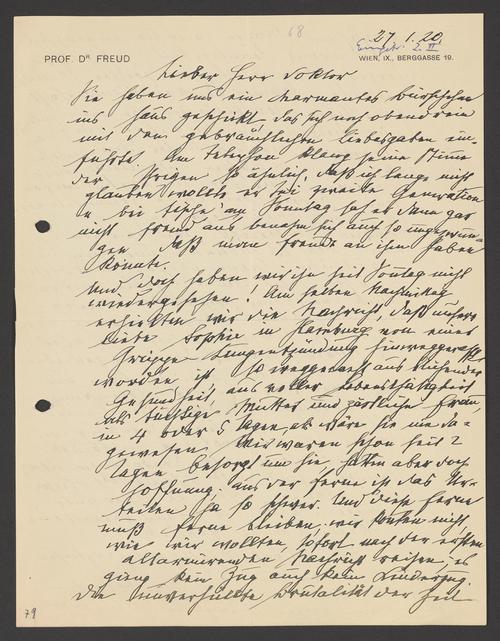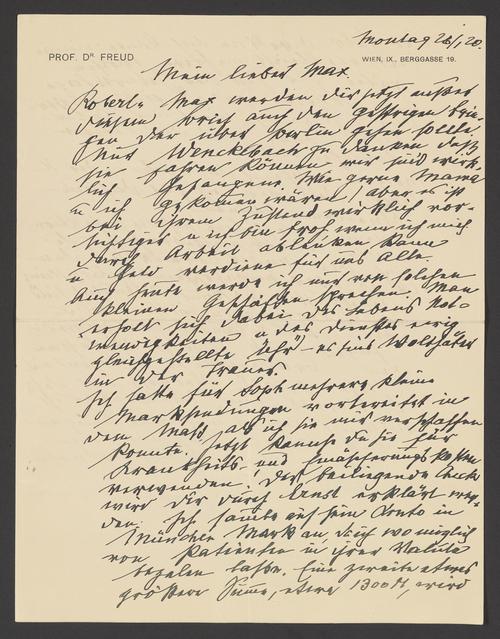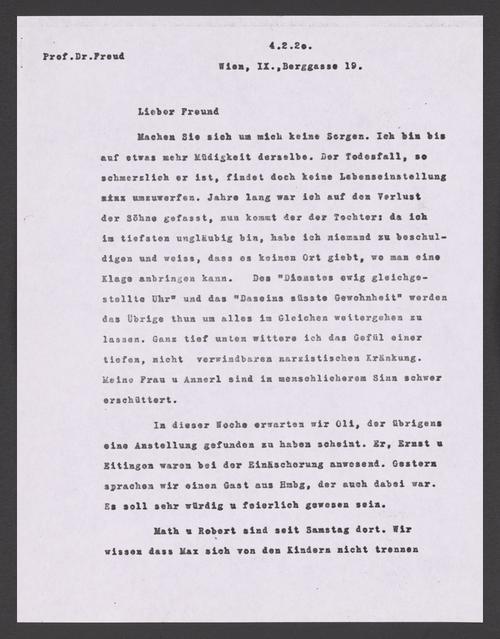
Freud to Oskar Pfister
7 January 1920
Dear Doctor,
[…]
That afternoon we received the news that our sweet Sophie in Hamburg had been snatched away by influenza pneumonia, snatched away in the midst of a glowing health, from a full and active life as a competent mother and loving wife, all in four or five days, as though she had never existed. Although we have been worried about her for a couple of days, we had nevertheless been hopeful; it is so difficult to judge from a distance. And this distance must remain distance, we were not able to travel at once, as we had intended, after the first alarming news; there was no train, not even for an emergency. The undisguised brutality of our time is weighing heavily upon us. Tomorrow she is being cremated, our poor Sunday Child! Our daughter Mathilde and her husband are leaving for Hamburg the day after tomorrow, thanks to an unexpected connection with an Entente train; at least our son-in-law was not alone; two of our sons who were in Berlin are already with him, and our friend Eitingon has gone with them.
Sophie leaves two sons, one of six, the other thirteen months, and an inconsolable husband who will have to pay dearly for the happiness of these seven years. The happiness existed exclusively within them; outwardly there was war, conscription, wounds, the depletion of their resources, but they had remained courageous and gay.
I work as much as I can, and am thankful for the diversion. The loss of a child seems to be a serious narcissistic injury; what is known as mourning will probably follow only later.

Freud to Max Halberstadt
26 January 1920
My dear Max
A young lady will take this letter to Berlin and post it there in Hamburg. It seems to me that I have never written one more superfluous. You know how great our pain is, we know how painful you must feel; I make no attempt to console you as you can do nothing for us. Perhaps you mean, I didn’t know what it means to lose one’s beloved wife and mother of one’s children, because I was spared it. You are right, but to survive the bitter illness so far in life and so near to death a young, blooming child must again be strange and incomprehensible to you. Also, this misfortune does not change my feelings for you, that you will remain our son as long as you wish to be, I do not need to tell you; it follows naturally from our previous relationship. So why am I writing to you? I believe just because we are not together and cannot come to each other in this miserable time of imprisonment, that I cannot say things to you that I repeat to her mother and siblings, that it is a senseless, brutal act of fate that stole our Sophie from us, something that you cannot accuse and brood about, but rather bow your head under the blow, as a helpless, poor person to play with the higher rules of law. Enough, she was happy as long as she lived with you, despite the difficult times that have fallen into your short marriage of 7 years, and her happiness was thanks to you.
Mama has completely collapsed, she wants to travel to you as soon as possible, the next appointment would be the 29th, and ask you what your intentions are with the children and household in the near future. I would rather see Math[ilde] and Robert travel in our place, because I have little confidence in Mama’s strength. Math[ilde] is smart and warm, Robert is a good guy and very moved at the moment. I’m also happy that Oli and then Ernst could be with you, especially after we sat so warmly with you in autumn.

Freud to Sandor Ferenczi
4 February 1920
Dear Friend
Please don’t worry about me. Apart from feeling rather more tired I am the same. The death, painful as it is, does not affect my attitude toward life. For years I was prepared for the loss of our sons; now it is our daughter; as a confirmed unbeliever I have no one to accuse and realize that there is no place where I could lodge a complaint. (…) Deep down I sense a bitter, irreparable narcissistic injury. My wife and Annerl are profoundly affected in a more human way.